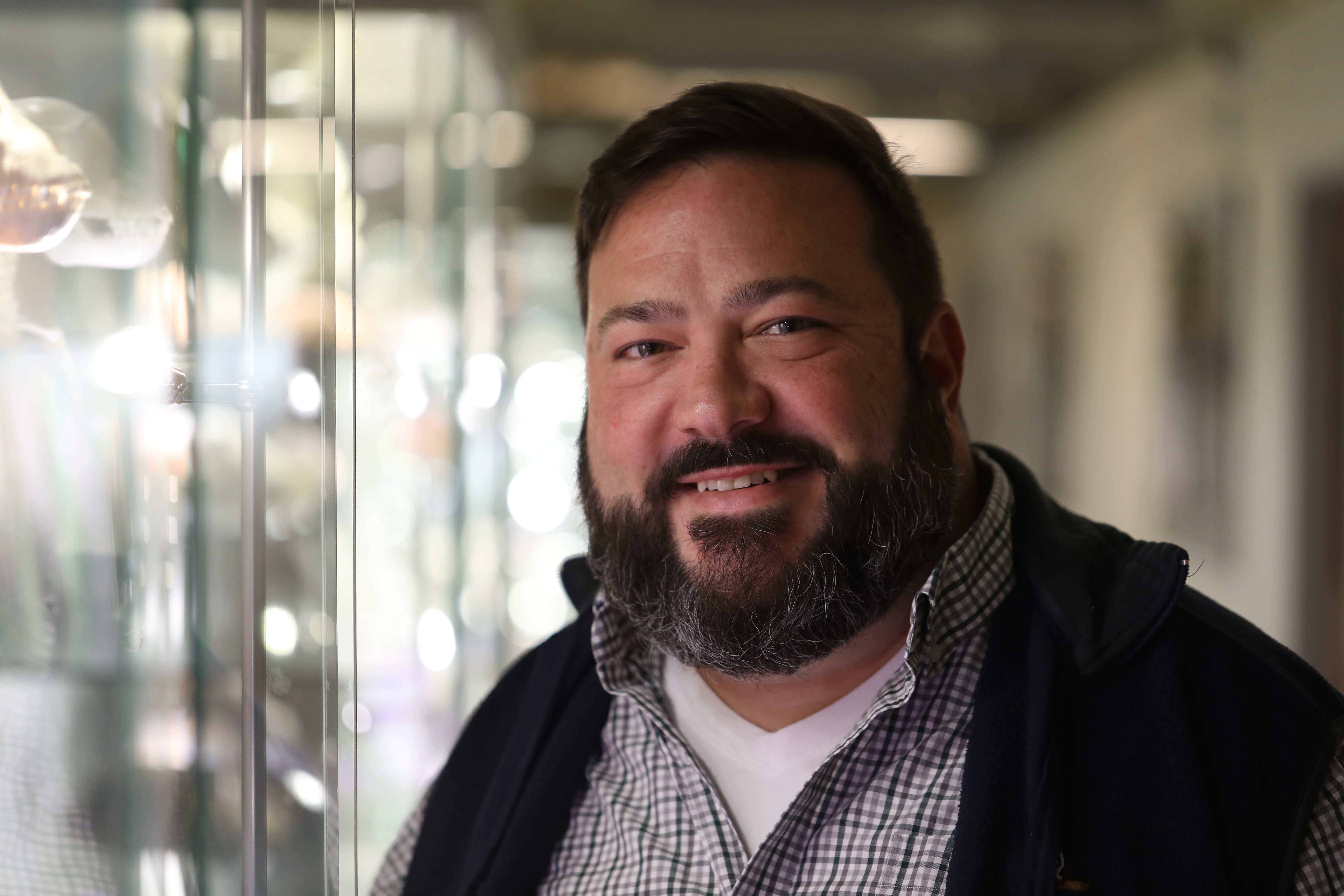Study Provides Insight into Community Dynamics During Once-in-a-Century Pandemic
Baylor biological anthropologist Michael Muehlenbein, Ph.D., seeks to understand the medical, social and psychological factors involved in a long-term pandemic response

Study Provides Insight into Community Dynamics During Once-in-a-Century Pandemic
Contact: Kelly Craine, Baylor University Media and Public Relations, 254-297-9065
Follow us on Twitter: @BaylorUMedia
WACO, Texas (May 2, 2023) – Results from the Waco COVID Survey have provided needed insights into how the dynamics of COVID-19 transmission, health behaviors and COVID-19-related attitudes changed across the first two years of the pandemic in the McLennan County, Texas.
The research article – The Waco COVID Survey: A Community-Based SARS-CoV-2 Serological Surveillance Study in Central Texas – is available in The Journal of Community Health.
At the start of the 2020, as COVID-19 began to spread across the world, Michael P. Muehlenbein, Ph.D., MsPH, professor, chair and graduate program director in anthropology at Baylor University, was uniquely positioned to respond to the once-in-a-century pandemic. As a biological anthropologist, Muehlenbein’s research focuses on global health, including emerging infectious diseases and travel medicine.
Muehlenbein and his extended research team (including graduate and undergraduate students and other faculty at Baylor) began collaborating with local health officials in April 2020 to develop a research study to understand the spread of the virus across the community. Funded locally by The Bernard and Audre Rappaport Foundation and the Cooper Foundation of Waco, Muehlenbein partnered with Waco Family Medicine, a Federally Qualified Health Center, and the Waco-McLennan County Public Health District to conduct the Waco COVID Survey.
The survey team recruited 495 participants based on their risk factors to exposure to the virus. Participants came from a variety of high-risk backgrounds, including health care workers and first responders, essential service employees, as well as individuals from families who practiced intensive isolation because of the social distancing recommendations. For 14 months, from July 2020 to late September 2021, participants were asked to provide blood samples for the serological portion of the study and respond to a series of questions on their experiences dealing with the pandemic.
“Originally we were trying to calculate the expected frequency of asymptomatic infections among individuals of different risk groups,” Muehlenbein said. “When we realized there was an opportunity to gather more than serology data, the study was expanded to include information from survey participants on health histories, behaviors and even attitudes about politics.”
From assessing the relationships among risk factors and asymptomatic transmission to understanding the social and psychological factors involved in a long-term pandemic response, the Waco COVID Survey expanded from a serological study to become a comprehensive study on the COVID-19 pandemic.
Risk, politics, PPE and stress
The findings from the project have contributed to the understanding of how individual differences in risk perception and political affiliation shape responses to COVID-19 disease risk, how germ aversion and stress decreased over time and the efficacy of both personal protective equipment and vaccinations. For example:
- Although individuals who lean Republican tend to express less concern about the pandemic and were less likely to wear masks in public, the research revealed that they were not less likely than those who lean Democrat to receive a COVID-19 vaccine. While these findings may be unique to the sample—or the local community—they nonetheless indicate that health behaviors do not always align perfectly with reported perception of health risk.
- COVID-19 fatigue grew as the pandemic continued. Attitudes on germ aversion and stress decreased across the study even though the virus continued to spread throughout the community.
- Individuals who reported wearing masks more often in public were less likely to receive a positive COVID-19 test than those who masked less often.
- The majority of survey participants who received a positive COVID-19 test during the study (75%) were unvaccinated at the time of infection. While there was only a single case of hospitalization due to COVID-19 in the sample, none occurred among those who were vaccinated.
Looking ahead
The project also provided unique opportunities for community involvement and for training future healthcare workers and researchers. The numerous student volunteers involved in the project were crucial to its success. The tangible and intangible skills students acquired through their involvement in the survey will serve them well on their way to becoming leaders in the local community and beyond.
Ultimately, Muehlenbein and the community coalition he brought together were able to gather important data from a once-in-a-century event that lays the groundwork for future community-focused projects, which may help better understand factors that contribute to local disease transmission.
Enough data were gathered to produce several published research papers:
- Unrealistic optimism and risk for COVID-19 disease published in Frontiers in Psychology (June 2, 2021) examined relationships among personal risk for severe COVID-19, risk perceptions and preventative behaviors.
- Longitudinal changes in COVID-19 concern and stress: Pandemic fatigue overrides individual differences in caution, published in the Journal of Public Health Research (Aug. 26, 2022) focused on individuals’ decrease in COVID-19 concern over time, despite their risk for infection remaining stable, or even increasing.
- Exploring links between pathogen avoidance motivation, COVID-19 case counts and immune function, published in the American Journal of Human Biology (Nov. 16, 2022), examined how cognitive, affective and behavioral disease avoidance mechanisms interact with the biological immune system.
- Age-Dependent relationships between disease risk and testosterone levels: Relevance to COVID-19 disease, published in the American Journal of Men’s Health (March 16, 2023), examined how greater burden of preexisting conditions for severe COVID-19 disease is related to lower testosterone levels in men younger than 40 years of age.
Additional papers are under review for future publication, including political affiliation as a health risk factor during the COVID-19 pandemic, relationships between menstrual cycle phase and immune responses, and the impact of the pandemic on individuals with autoimmune diseases.
*In addition to Muehlenbein, co-authors included Jeffrey Gassen, Ph.D., Tomasz J. Nowak, Ph.D. candidate, and Alexandria D. Henderson, Ph.D. student, Departments of Anthropology and Biology; Sally P. Weaver, Ph.D., M.D., Waco Family Medicine; and Erich J. Baker, Ph.D., professor of bioinformatics and interim dean of the School of Engineering and Computer Science at Baylor University.
ABOUT BAYLOR UNIVERSITY
Baylor University is a private Christian University and a nationally ranked Research 1 institution. The University provides a vibrant campus community for more than 20,000 students by blending interdisciplinary research with an international reputation for educational excellence and a faculty commitment to teaching and scholarship. Chartered in 1845 by the Republic of Texas through the efforts of Baptist pioneers, Baylor is the oldest continually operating University in Texas. Located in Waco, Baylor welcomes students from all 50 states and more than 100 countries to study a broad range of degrees among its 12 nationally recognized academic divisions.
ABOUT THE COLLEGE OF ARTS & SCIENCES AT BAYLOR UNIVERSITY
The College of Arts & Sciences is Baylor University’s largest academic division, consisting of 25 academic departments in the sciences, humanities, fine arts and social sciences, as well as 10 academic centers and institutes. The more than 5,000 courses taught in the College span topics from art and theatre to religion, philosophy, sociology and the natural sciences. Faculty conduct research around the world, and research on the undergraduate and graduate level is prevalent throughout all disciplines. Visit the College of Arts & Sciences website.
